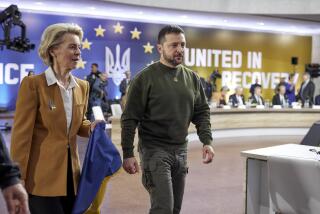Declaration Stands, Lithuania Decides : Secession: Action virtually ensures that crippling Soviet sanctions will continue.
- Share via
MOSCOW — Lithuanians searched Saturday for concessions to offer Mikhail S. Gorbachev as a way of opening talks with the Soviet leadership but ruled out suspending their declaration of independence, which virtually ensures that crippling Kremlin economic sanctions against them will continue.
Reporting to an emergency session of the Lithuanian parliament, Kazimiera Prunskiene, the breakaway republic’s prime minister, summed up talks she held in Moscow with Gorbachev. Then deputies debated proposals they hope will bring Soviet authorities to the bargaining table to end a two-month-old stalemate.
Though no formal vote was taken, lawmakers concurred that “there can be no question” of suspending the independence declaration they approved March 11, Arvidas Ryabchis, a spokesman in the Parliament’s Information Bureau, said by telephone from the Lithuanian capital of Vilnius.
The March 11 declaration set off the crisis with Moscow. Unless the Lithuanians reverse themselves or there is a dramatic shift in the position of Gorbachev, who has repeatedly said the proclamation is illegal under Soviet law, the war of nerves over Lithuania’s right to unilaterally proclaim its independence seems certain to continue.
In a dispatch printed earlier on the front pages of Soviet newspapers, the official Tass news agency said the bottom line of the Kremlin’s position is “the indispensable necessity that the Lithuanian Supreme Soviet (Parliament) cancel--or at a minimum, suspend--this act (the independence declaration) and all the legislative measures following it that contradict the Soviet constitution.”
In her remarks in Parliament, Prunskiene acknowledged that Gorbachev, who met with her Thursday, was still pressing for suspension of the independence declaration.
According to Edward Tuskenis, another Information Bureau spokesman, Prunskiene said suspension would be too risky because it would juridically return Lithuania to the status of a “Soviet socialist republic” that it had for 50 years after annexation by the Kremlin in 1940.
“What the deputies will do is review laws passed since March 11 and see which can be suspended,” Tuskenis said. Gorbachev has specifically objected to laws establishing separate Lithuanian identity cards and annulling mandatory Soviet military service and to the alleged confiscation of Communist Party property.
The Lithuanian deputies adjourned Saturday night without making a formal decision. They are to reconvene Monday to hear legal experts and reports from economists on the damage done by the Soviet economic sanctions imposed in April. Parliament is to consider several drafts of concessions it might offer Moscow, and Prunskiene sounded optimistic that the proposals would win its agreement for negotiations.
“To my mind, all possible effort has been made from our side,” she told state-run Soviet television.
Secretary of State James A. Baker III, who met Friday with Prunskiene in the Soviet capital, expressed support here for Lithuania’s “hopes and aspirations for independence” and again called for dialogue between the two sides.
Addressing a news conference, Baker denied a published report that he had pressed the Lithuanians to suspend their independence declaration, saying, “That is not for me to do.”
More to Read
Sign up for Essential California
The most important California stories and recommendations in your inbox every morning.
You may occasionally receive promotional content from the Los Angeles Times.













